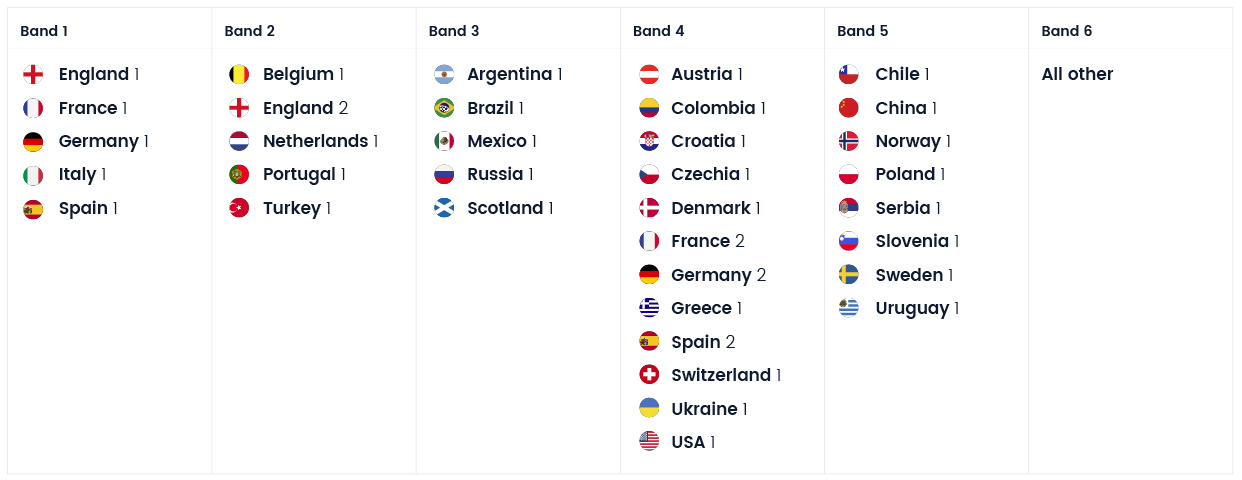
The Strategic Opportunities Presented by GBE Rule Changes in English Football
In June 2023 the UK Home Office approved new Governing Body Exemption (GBE) Criteria for international player visas which came into effect for the European summer transfer window.
It is expected that the changes that have been made to the system will have far-reaching impacts on the player trading and multi-club ownership activity of Premier League clubs as the Football Association (FA) tries to course-correct the rules it introduced in 2021.
Why does the UK have GBE rules?
When the United Kingdom left the European Union on 31st January 2020, British football clubs were no longer legally able to sign players aged under 18 from EU markets. Additionally, the UK government introduced a ‘points-based’ immigration system which means those wanting to work in the UK must meet a certain number of criteria in order to get clearance to do so.
Football is not immune from government policy and so since January 2021 foreign signings made by English clubs have been subject to the FA’s own points-based system. In order to be approved to play in the UK, players must be awarded a GBE. Prior to the recent rule change, there were three ways players could qualify:
An ‘Auto Pass’ for players regularly featuring for teams in the top 50 of the FIFA world rankings (based on a sliding scale of the proportion of games a player has played in for their national team over a 24 months period);
The accumulation of at least 15 GBE points across six criteria related to club and league quality, league position and minutes played in domestic and continental competition; or
An affirmative ruling by the Exceptions Panel for players who have accumulated 10-14 points and been prevented from accumulating 15 due to exceptional circumstances, or individuals who can be proven to be youth players of “significant potential” that will “enhance the development of the game in England”.
If they don’t qualify for an Auto Pass, the scope for players to accumulate GBE points is largely determined by the strength of their domestic league, all of which are separated out into ‘Bands’ by the FA. The higher the band, the more points are allocated for playing time. For example, 30% of minutes in a Band 1 league (i.e. La Liga, Bundesliga) gives a player 6 GBE points, whereas the same playing time in a Band 4 league (i.e. Czech First League, Swiss Super League) awards nothing.
The FA’s original league bandings from when the GBE system was first rolled out are shown below.

The first iteration of the GBE rules set a high barrier to entry, making it very difficult for English clubs to sign players from Band 4 leagues due to the exorbitant minutes requirements needed to score any GBE points. Many clubs have agitated against the rules and deemed them to be too restrictive and therefore potentially damaging to the competitiveness of the Premier League over time. As a result, just 30 months after the introduction of its initial rules, the FA has moved to relax its GBE criteria.
What’s changed?
The recent changes to the GBE criteria see the three pre-existing pathways to GBE qualification joined by a fourth which has been named the Elite Significant Contribution (ESC) route. In the FA’s own words, the ESC route is designed to “provide additional access to exceptional international talent which falls outside of the current GBE criteria.”
In practice, this means that English clubs will now be permitted to sign a fixed number of foreign players who do not meet the GBE rules as originally set out. A maximum of four players will be available to Premier League and Championship clubs, while teams in League One and League Two will be allowed up to two. The number of exemptions a club is allowed will be proportional to the number of minutes they give to English-qualified players (EQP) in future seasons. The higher a club’s proportion of EQP minutes, the more ESC players it can add to its squad, flexing up and down between zero and four depending on the EQP minutes % and the league the club plays in.
In addition to the introduction of the ESC pathway, the FA has also adjusted some of the league bandings in an attempt to more accurately reflect the quality of competitions worldwide:
Promotions: USA 1 (Band 4 to Band 3), Hungary 1 (Band 6 to Band 5), Italy 2 (Band 6 to Band 5), Japan 1 (Band 6 to Band 5), South Korea 1 (Band 6 to Band 5)
Demotions: Russia 1 (Band 3 to Band 4), China 1 (Band 5 to Band 6)
What opportunities do the new rules present?
The most obvious benefit of the new rules is that English clubs are now free to recruit young players directly from markets that were previously inaccessible as a result of the league bandings. For example, it is now possible for teams to sign players directly from African clubs or academies, something that was all but impossible previously due to all African leagues being assigned to Band 6.
This new (albeit restricted) access to global markets that were previously off-limits is likely to save English clubs money as they can sign players from source rather than having to wait for them to accrue the necessary number of GBE points (and therefore increase their valuations) in other European or South American markets before bringing them to England.
The rule changes are also likely to have an impact on how teams and their owners think about the construction of multi-club groups.
Since the UK’s Brexit vote in 2016 there has been an increase in owners of Premier League clubs buying controlling stakes in teams in other European markets. As it stands today, current Premier League ownership groups own stakes in 23 other European football clubs. One of the key motivating factors behind this activity has been unfettered access to European youth talent and a waypoint for international players to accrue GBE points before being moved into the parent club.
Given the quality of the talent pool, finding efficient ways to access the European market will continue to be essential for Premier League clubs. However, the new rules do give teams more latitude to look beyond Europe as they seek to gain direct access to the best sources of young talent across the globe.
This freedom to sign players from a greater diversity of markets may see a shift in thinking around multi-club strategy. Rather than focusing as heavily on Europe, there is likely to be a far greater level of interest in acquiring or building strong partnerships with clubs or academies in African and Asian markets.
Aston Villa’s partnership with ZED FC in Egypt is an example of an existing arrangement that other Premier League clubs may look to replicate, while others may go further and look to the example of FC Nordsjaelland as a blueprint for the benefits that deep partnerships in strategic markets (West Africa in FCN’s case) can deliver in terms of access to talent.
At Sportsology Group we are watching with interest to see how the new GBE rules spark new ideas and innovation in the UK market and look forward to supporting clubs as they navigate the new landscape and find competitive advantages within it over the seasons ahead.











